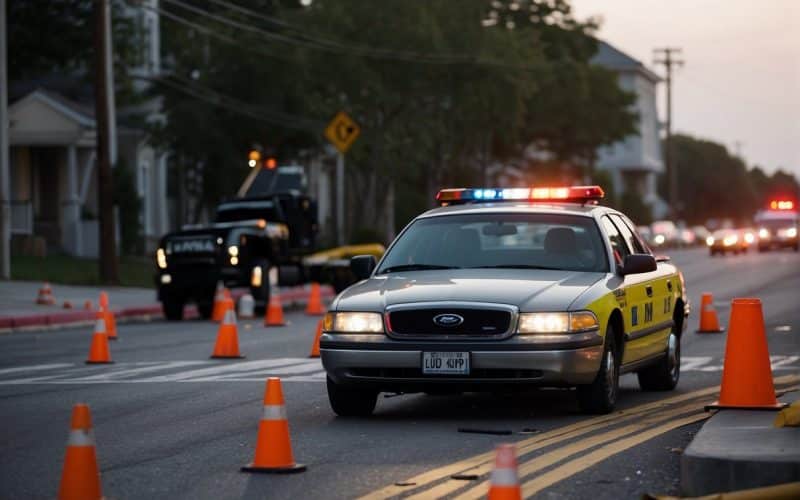Being involved in an accident is an unsettling experience, but the steps you take immediately afterwards can significantly impact the strength of your subsequent insurance or legal case. It is crucial to remain composed and gather as much information as possible at the scene. Collecting evidence begins the moment the accident occurs and includes taking pictures of the vehicles, the surrounding area, and any injuries sustained.
Securing witness statements and their contact details can provide corroborative accounts that may prove indispensable later on. They can help to establish the facts of the case and provide an unbiased perspective of the event. It is also essential to exchange information with the other parties involved, regardless of who may be at fault.
Contacting law enforcement is a key action to take after an accident. A police report offers an official record of the incident, which is an authoritative document that insurance companies and attorneys rely on. This report can help to clarify the circumstances of the accident and is often a foundational piece of evidence when determining liability and pursuing claims.
Immediate Actions at the Accident Scene
Taking precise steps immediately after an accident can be crucial for strengthening a case. These actions ensure safety, aid in documentation, and involve the appropriate authorities.
Ensuring Safety and Medical Attention
Firstly, assess personal safety and that of others involved. If necessary, move to a secure location away from traffic. Call 911 immediately if there are any injuries or if it’s safe to provide first aid, do so. It is vital to get medical attention, even for minor injuries, as they may be more severe than initially thought and play a significant role in legal proceedings.
Documenting the Scene and Gathering Information
Subsequently, document the accident scene. Take multiple photos from various angles of the vehicles, road conditions, traffic signs, and injuries. A table format may assist in organizing information:
| Information Type | Details to Capture |
| Vehicle Details | Make, model, license plate, and damage |
| Driver Information | Name, contact information, insurance |
| Witness Contact Information | Names, phone numbers |
One should also gather contact details from witnesses. They can provide objective accounts later, which bolsters the case.
It is imperative to notify the police. An accident report by law enforcement serves as an official record and can be significant evidence. Even in minor incidents, a police report may be required by insurance companies. Provide factual statements but avoid accepting blame or assigning it at this stage.
Legal Considerations Post-Accident
After an accident, understanding the legal steps is critical for preserving your rights and strengthening your case. These actions help ensure that the case reflects an accurate and well-documented account of events.
Understanding State Laws and Regulations
It is essential to familiarize oneself with the specific laws and regulations of the state where the accident occurred. In Pittsburgh, as in the rest of Pennsylvania, drivers are generally required to:
- Remain at the scene: Leaving the scene of an accident can result in serious penalties.
- Exchange information: Provide and collect names, addresses, driver’s license numbers, vehicle registrations, and insurance information.
- Report the accident: If there are injuries, death, or significant property damage, the accident must be reported to the police.
- Take notes and photographs: Document the scene, including road conditions, traffic signs, and vehicle positions. This can be invaluable for a car accident lawyer in Pittsburgh representing your case.
Contacting Your Insurance Company
After ensuring safety and collecting necessary information at the scene, individuals should contact their insurance company to report the accident. It is advisable to do this as soon as possible due to:
- Policy Requirements: Many insurers impose strict deadlines for reporting accidents.
- Claim Processing: Early reporting allows for timely claim processing.
When speaking with the insurer, be factual about the incident details but avoid admitting fault or making definitive statements about the accident, as these can affect the outcome of the claim.
In situations where legal action becomes necessary, consulting with a qualified car accident lawyer in Pittsburgh is advisable. The lawyer can navigate the complexities of state laws, engage with insurance companies, and advocate on your behalf.
Consulting with a Car Accident Lawyer
After a car accident, consulting with a lawyer can be crucial in protecting one’s legal rights and interests. An experienced car accident lawyer can navigate the complex legal system and help build a strong case for compensation.
Choosing the Right Lawyer for Your Case
When selecting a car accident lawyer in Pittsburgh, it is important for individuals to conduct thorough research. Relevant factors may include:
- Experience: Look for lawyers who specialize in motor vehicle accident cases.
- Track Record: Verify their history with similar cases and outcomes.
- Reputation: Read testimonials and reviews from former clients.
Credentials to consider:
| Credential | Description |
| Bar Association Membership | Verify membership in the Pennsylvania Bar Association. |
| Certifications | Specializations in personal injury or car accident law. |
Preparing for the Initial Consultation
Individuals should arrive at the consultation with all necessary documentation to assist the attorney in understanding the accident. This includes:
- A copy of the police report
- Photos from the accident scene
- Medical records and bills related to the injury
- Any correspondence with insurance companies
Preparation Checklists:
- Documentation: Gather all accident-related documents.
- Questions: Prepare a list of specific questions for the lawyer.
- Expectations: Have a clear idea of what you expect from the legal proceedings.
Discussing Legal Strategy and Representation
During the initial meeting, potential clients should discuss the lawyer’s approach to handling car accident cases. Ask about:
- Case Evaluation: The lawyer’s assessment of the case and expected outcomes.
- Legal Strategy: How the lawyer plans to proceed with the claim or lawsuit.
- Communication: Methods and frequency of updates on the case progress.
By focusing on these key considerations, individuals can better understand the legal process and how an experienced car accident lawyer in Pittsburgh can represent their interests.






